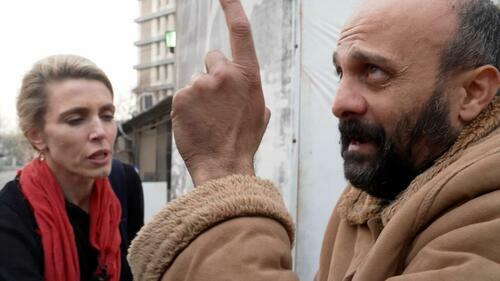In a recent expose, the CNN network faced significant backlash for a report that sensationalized the rescue of a supposed victim of the Assad regime, only to reveal that the individual in question was a regime intelligence officer with a history of criminal activity. CNN’s chief international correspondent, Clarissa Ward, portrayed this man as a victim emerging from a Damascus prison, captivating audiences with emotionally charged storytelling. However, subsequent investigations proved that the “rescued” individual, initially introduced as Adel Ghurbai, was, in fact, Salama Mohammad Salama, a notorious first lieutenant in Syrian Air Force Intelligence, implicated in various human rights abuses including theft, extortion, and torture.
Emerging reports from the Syrian fact-checking site Verify-Sy highlighted the true identity of the man in question, showcasing his involvement in the regime’s brutal actions against civilians, particularly during military operations in Homs. Contrary to the sobering narrative spun by CNN, the individual had been held in detention for a mere month due to internal disagreements with higher-ranking officials, and locals quickly recognized his notoriety. This backpedaling by CNN came after widespread skepticism circulated on social media and blog platforms, leading the network to acknowledge Verify-Sy for uncovering Salama’s criminal background while ironically withholding accountability for their initial misrepresentation.
Critics of the report seized on the numerous inconsistencies in the video, questioning the authenticity of the scene depicted. In an overly dramatic reading, the report portrayed Ward and her cameraman as if they were navigating a high-stakes rescue. Skeptics documented several peculiarities in the footage, including the subject’s pristine appearance and demeanor, casting doubt on his supposed plight as a wrongfully imprisoned victim. Viewers noticed that his well-groomed appearance, as well as his seemingly carefree attitude upon being discovered, did not align with the narrative of an innocent individual subjected to horrific conditions, raising eyebrows regarding the authenticity of the presentation.
Moreover, discussions surrounding Ward’s history of advocacy for U.S. intervention in Syria added layers of scrutiny to the report. Ward herself acknowledged her emotional engagement with the crisis in the region, admitting to crossing journalistic boundaries in her previous reporting. A particular instance cited was her blunt communication to a White House official lamenting the lack of U.S. involvement in Assad’s downfall, portraying her staunch alignment with regime-change efforts. Such admissions contributed to perceptions that her reporting may have been driven more by an agenda than a commitment to sober and objective journalism, ultimately raising questions about the integrity of the narratives disseminated through prominent media outlets like CNN.
Following the backlash against the original coverage, CNN later released a follow-up article that partly recounted the coverage and revealed the actual identity of the man portrayed as a victim. However, critics lambasted the network for failing to take responsibility for its initial reporting mistakes. The follow-up report fell short of providing a thorough contextual analysis of the staged nature of the initial presentation, leading many to characterize the CNN response as one lacking in accountability and journalistic standards. This incident reinforced a growing trend of skepticism towards mainstream media, particularly regarding its ability to provide accurate portrayals of complex situations in conflict zones.
As reactions to the report and its aftermath unfolded, social media served as a vital platform for interrogating the integrity of not just CNN, but broader media narratives around the Syrian conflict. By highlighting discrepancies in the portrayals of victims and aggressors, users called attention to the moral responsibility of journalists to ensure accuracy over dramatization. This incident exemplified not only a failure in journalism but also a broader concern about the power of media narratives to shape public perception and policy, especially in sensitive geopolitical matters. As the dialogue on accountability and ethical journalism continues, the CNN affair serves as a cautionary tale of the consequences of compromising journalistic integrity for sensational narratives.

